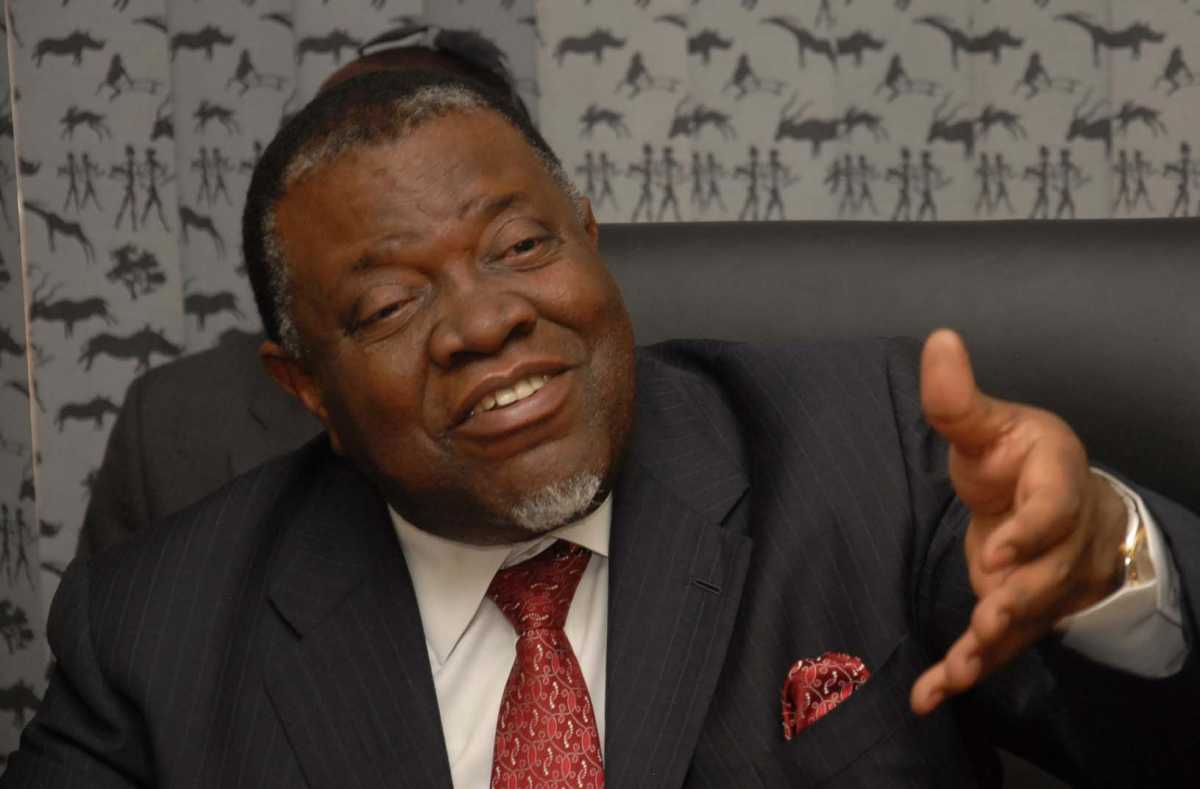Namibia: Namibia Government Profile
2015/01/24

The president, who shares executive power with the cabinet, is limited to two five-year terms.
Namibian President Pohamba Mr Pohamba was a founding member of the rebel movement which fought for independence
republic
13 regions; Caprivi, Erongo, Hardap, Karas, Khomas, Kunene, Ohangwena, Okavango, Omaheke, Omusati, Oshana, Oshikoto, Otjozondjupa
21 March 1990 (from South African mandate)
Independence Day, 21 March (1990)
ratified 9 February 1990, effective 12 March 1990
based on Roman-Dutch law and 1990 constitution; has not accepted compulsory ICJ jurisdiction
18 years of age; universal
bicameral legislature consists of the National Council, primarily an advisory body, (26 seats; two members chosen from each regional council to serve six-year terms) and the National Assembly (72 seats; members elected by popular vote to serve five-year terms) elections: National Council - elections for regional councils to determine members of the National Council held on 29-30 November 2004 (next to be held in November 2010); National Assembly - last held on 26-27 November 2009 (next to be held in November 2014) election results: National Council - percent of vote by party - SWAPO 89.7%, UDF 4.7%, NUDO 2.8%, DTA 1.9%, other 0.9%; seats by party - SWAPO 24, UDF 1, DTA 1; National Assembly - percent of vote by party - SWAPO 75.3%, RDP 11.3% DTA 3.1%, NUDO 3.0%, UDF 2.4%, APP 1.4%, RP 0.8%, COD 0.7%, SWANU 0.6%, other 1.3%; seats by party - SWAPO 54, RDP 8 DTA 2, NUDO 2, UDF 2, APP 1 RP 1, COD 1, SWANU 1
Supreme Court (judges appointed by the president on the recommendation of the Judicial Service Commission)
All People's Party or APP [Ignatius SHIXWAMENI]; Congress of Democrats or COD [Benjamin ULENGA]; Democratic Turnhalle Alliance of Namibia or DTA [Katuutire KAURA]; Monitor Action Group or MAG [Jurie VILJOEN]; National Democratic Movement for Change or NamDMC; National Unity Democratic Organization or NUDO [Kuaima RIRUAKO]; Rally for Democracy and Progress or RDP [Hidipo HAMUTENYA]; Republican Party or RP [Hendrick MUDGE]; South West Africa National Union or SWANU [Usutuaije MAAMBERUA]; South West Africa People's Organization or SWAPO [Hifikepunye POHAMBA]; United Democratic Front or UDF [Justus GAROEB]
Earthlife Namibia [Berthchen KOHRS] (environmentalist group); National Society for Human Rights or NSHR; The World Information Services of Energy or WISE (group against nuclear power)
ACP, AfDB, AU, C, FAO, G-77, IAEA, IBRD, ICAO, ICCt, ICRM, IDA, IFAD, IFC, IFRCS, ILO, IMF, IMO, Interpol, IOC, IOM, IPU, ISO (correspondent), ITSO, ITU, ITUC, MIGA, MINURCAT, NAM, OPCW, SACU, SADC, UN, UNAMID, UNCTAD, UNESCO, UNHCR, UNIDO, UNMIL, UNMIS, UNOCI, UNWTO, UPU, WCO, WFTU, WHO, WIPO, WMO, WTO
a wide red stripe edged by narrow white stripes divides the flag diagonally from lower hoist corner to upper fly corner; the upper hoist-side triangle is blue and charged with a yellow, 12-rayed sunburst; the lower fly-side triangle is green
- Namibia News
-
- BOTSWANA: Routes Africa forum aims to improve African air connectivity
- BOTSWANA: Economic integration is helping boost trade and investment in Africa
- BOTSWANA: Africa’s economic growth is likely to be slower in the intervening years
- BOTSWANA: Beyond Commodities: How African Multinationals Are Transforming
- NAMIBIA: Namibia: FNB Housing Volume and Value Index Retreated
- BOTSWANA: Africa,Protect Refugees With Mobile Banking
- Trending Articles
-
- ABIDJAN: Cote d’Ivoire to re-emerge as a tourism destination
- NIGERIA: Nigeria’s e-commerce industry shows growth potential
- UKRAINE: Yatsenyuk Resigns: The Shift in Ukrainian Politics
- UNITED STATES: Trump says Britain should leave EU
- SERBIA: China’s Xi sees Serbia as milestone on new ‘Silk Road’
- UNITED KINGDOM: Cameron urges Britons to register for EU vote


